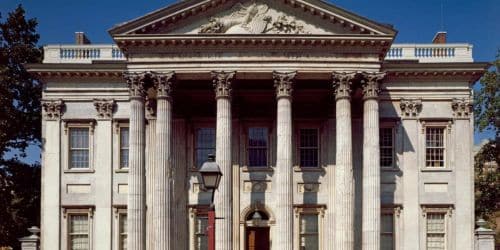Compared to smaller banks, national banks have certain significant advantages. They offer more features and services and are more practical. Many of the major ones, including Chase, Bank of America, and Wells Fargo, are certainly familiar to you. Which is the ideal? How do you pick one over the other? Read on to see the best national banks in America for 2023. We also added the list of the best national banks for small businesses and personal banking to help you make an easy choice. Enjoy the ride!
What Are National Banks?
The United States federal government oversees financial institutions known as “national banks.” National banks typically serve the entire country, however, others focus on certain areas. However, not all national banks have physical locations. The best national banks on this list include convenient online options. The Federal Deposit Insurance Corporation protects deposits at national banks. Deposits up to $250,000 per depositor and ownership type are protected against the bank going under thanks to this governmental guarantee.
Best National Banks 2023
Have you been thinking of what the best national banks in 2023 might be? The following is the list of the best national banks in 2023:
#1. CHASE BANK
Chase offers significant bonus incentives, exceptional customer support, and distinctive checking alternatives for a range of requirements. In terms of assets, Chase is the biggest bank in the US. With 4,700 branches and more than 16,000 ATMs, it has more locations than anyone else. It is the only national bank with locations in all 48 states that are adjacent.
There are numerous checking account choices at Chase. If you deposit just $500 in direct deposits each month into the most popular Total Checking account, you can avoid paying the monthly charge (don’t forget to take advantage of the bonus if you apply). A few premium accounts are also available, including the top-tier Chase Private Client.
Even accounts that many other banks do not provide are available through it. Examples include a Secured Checking account for those who have problems opening traditional checking accounts, as well as a Student Debit Card and a Debit Account for college students.
Pros
- More than 4,700 branches
- Generous promotions
- Easy to waive fees
Cons
- Fewer branches in some states
- Low savings interest rates
#2. Bank of America
Bank of America is one of the best national banks on the list with combined assets of $2.41 trillion. The company’s decision to locate its headquarters in Charlotte, North Carolina has helped to establish the city as a major financial hub in the United States. This firm is not the largest bank, but it does own Merrill Lynch, the undisputed leader in wealth management, making it the largest wealth management organization in the world.
Although Chase has more locations nationwide, Bank of America is not far behind with close to 5,000 locations. It all began in the early 1900s with a little San Francisco institution serving Italian immigrants and interestingly enough being named the Bank of Italy. Having acquired a share in a Chinese Construction Bank, Bank of America temporarily dabbled with Chinese banking before selling its holdings.
Pros
- Top-tier banking app
- Flexible account options
- Wide range of products
Cons
- Monthly service fee
- Miscellaneous banking fees
#3. CIT BANK
CIT Bank has competitive interest rates for savings accounts. There are no maintenance fees associated with any of CIT’s bank accounts. The annual percentage yield (APY) on your whole amount in CIT’s Savings Connect savings account is 4.60%. There is no minimum balance requirement after the initial deposit of $100 is made. However, CIT’s Platinum Savings is the way to go if you can keep $5,000 in the bank. With a balance of $5,000 or more, you’ll receive a 4.85% APY.
A money market account and CDs with attractive annual percentage yields are also available. They even provide a novel no-penalty CD that enables you to access your money whenever you need it without incurring any penalties. CIT operates as an Internet financial institution. Everyone in the country has equal access to their competitive rates. It is one of the best national banks for personal banking you can go for.
#4. Wells Fargo
Wells Fargo is one of the national banks, holding $1.71 trillion in assets after merging with Norwest Corporation in 1998 and acquiring Wachovia National Bank in 2008. However, Statista reports that it has 4,874 branches, making it the most extensive bank in terms of this metric. San Francisco is home to the company’s administrative offices and main branch.
The charter for Wells Fargo Bank was granted in 1852, making it the nation’s oldest continually functioning bank. This property was originally awarded to the First National Bank of Philadelphia and was subsequently acquired by Wachovia. In 2016, the bank became somewhat infamous after reports surfaced regarding a pervasive culture in which workers felt driven to open 2 million customer bank accounts without their knowledge or consent. In 2019, CEO Tim Sloan resigned after facing many allegations related to illegal foreclosures and violations of consumer protection legislation.
Pros
- Wide range of services and less-common offerings
- Large mortgage lender
- 24/7 fraud monitoring
Cons
- Suboptimal interest rates
- Overdraft protection fees
#5. CITIBANK
Citibank is a global bank with no ATM fees and a competitive annual percentage yield on savings accounts. Although Citibank’s U.S. presence is limited to California and New York, the bank is extremely well-established in other parts of the world. There are almost a thousand international banking offices in addition to the over 700 domestic ones. You can still use your bank’s branches and ATMs even if you do a lot of traveling.
There are over 65,000 fee-free ATM locations in the United States, including Target, CVS, and Rite Aid, thanks to partnerships with Citi, Allpoint, and MoneyPass. Citibank offers bundles that include a checking and savings account. If you’re able to make the larger deposits required to claim the welcome bonuses, it gives some of the largest bonuses available.
An Accelerate High-Yield Savings Account is also available and pays 4.05% interest per year. The only major traditional bank to match the high savings rates of online banks is Citi. It is one of the best national banks for personal banking you can opt for.
Pros
- Perks for high-balance customers
- Many fee-free ATMs
- Global presence
Cons
- Not a lot of branches in the US
#6. U.S. Bank
U.S. Bancorp, of which U.S. Bank is a subsidiary, has consolidated assets of more than $585 billion. The Minneapolis-based bank primarily serves customers in the Midwest and Western United States. The number of domestic branches is 2,352.
Old National Bank, Heritage Bank, People’s National Bank, Northwestern Commercial Bank, Heart Federal Savings & Loan, and West One Bancorp are only a few of the significant regional banks that have merged to form the current bank. Following its purchase and rebranding as U.S. Bancorp in 1997, First Bank System became under the management of Firstar Corporation in 2000.
Since 1933, it has been illegal for banks to use the word “United States” in their names, but the newly merged bank has preserved the U.S. Bancorp moniker. Pacific Century Bank, Bay View Bank, Vail Institutions, Downey Savings and Loan, and Charter One Bank are just some of the other institutions it has bought in recent years.
Pros
- Promo CD with high APY
- Free student account
- 24/7 customer service
Cons
- Very limited east coast presence
- Low savings APY
#7. PNC BANK
With PNC’s innovative checking and savings account, you get a wide range of convenient digital services all in one spot. The PNC Bank was a major East Coast institution. The 2021 purchase of BBVA allowed the company to expand into new regions in the south and west. Over 2,600 of its bank branches can be found in 28 different states, making it one of the largest national banks in the United States.
Virtual Wallet is PNC’s most well-known offering. The package includes a “Spend” account for regular expenses, a “Reserve” account for more immediate needs, and a “Growth” account for more distant aspirations. It also includes a ton of tools to support you in taking charge of your finances. You can plan out your finances, allocate funds, track your progress toward savings targets, plan for unexpected expenses, and more.
When you create a new account with PNC, you can sometimes get a cash incentive. It is one of the best national banks for personal banking you can go for.
Pros
- Virtual Wallet tools
- Easy to waive fees
- Free student account
Cons
- Not in some regions
- Low APY
#8. DISCOVER BANK
Another well-liked virtual financial institution is Discover. It provides conventional financial services such as checking, savings, money market, certificate of deposit, and loan accounts. You get access to over 60,000 ATMs nationally at no cost and can contact customer service at any time. You can earn one percent cash back on up to three thousand dollars worth of debit card purchases per month with the Cashback Debit checking account. There is no minimum amount required and no monthly service charges. To learn more, visit the website.
It’s the closest thing to free checking that exists. There are no fees associated with regular checks, stop payments, NSFs, or incoming wires. Only when making an out-of-network ATM withdrawal or international wire transfer will you incur fees? Discover’s credit card products are its bread and butter. Both cash and travel prizes are available. There is no yearly fee or additional charge for using a credit card outside of the country. It is one of the best national banks in 2023.
Pros
- Higher yields than other banks
- No fees
- 24/7 customer service
Cons
- No interest checking
- Higher deposit for CDs
Best National Banks for Small Businesses
There are some national banks for small businesses you can opt for to help boost your business. The following are the best national banks for small businesses you can go for:
#1. Bluevine
Bluevine may not offer as many banking services as some of its rivals on this list, but it does have a superior business line of credit options and an excellent interest-bearing business checking account. With a $250,000 minimum amount and either $500 in monthly debit card purchases or $2,500 in monthly client payments, the business checking account offers 2.0% APY. It also includes two annual orders of free checkbooks.
From the Bluevine control panel, you may now send payments in eight different currencies to 26 different countries, with the recipient receiving their funds in as little as 24 hours. It costs $25 to send a payment in USD, and $25 + 1.5% of the payment amount for all other currencies. No minimum opening deposit or minimum balance is required, and neither are there any monthly fees or transaction fees. Bluevine also offers superb integrations with other programs.
You can only make cash deposits at a Green Dot retail location, and doing so will cost you $4.95. Withdrawals from non-Bluevine ATMs incur a $2.50 fee in addition to any applicable third-party fees. It is one of the best national banks for small businesses you can choose for the growth of your business.
Pros
- Interest-earning checking on balances of $250,000 or less
- Integrates with QuickBooks
- Excellent line of credit product
Cons
- No savings, money market, and certificate of deposit (CD) accounts
- No physical branch locations
- Only one debit card is issued per account
#2. Capital One
Capital One is a great option for small businesses because it offers free monthly transactions with no limits. It would be more appealing if it weren’t restricted to a specific area. You can only open an account in one of their branches, and you’ll only find those in six states and DC.
Capital One stands out from the other traditional banks in this list since it does not impose fees on standard account transactions. You can make as many deposits and withdrawals as you like, while international wire transfers and cashier’s checks are not included in this. After the first $5,000 cash deposits are made each month, your company will be charged $1 for every $1,000 deposited.
The $15 monthly charge can usually be waived without any hassle. Fee exemption begins at a 30- or 90-day average balance of $2,000. Unlimited Business Checking from Capital One is designed for companies with large daily cash flows.
Pros
- Unlimited transactions
- Easy ATM access
- Low or no monthly fee
Cons
- Requires a $250 opening deposit
- Account opening cannot be done online
- Account doesn’t earn interest
#3. Huntington Bank
When it comes to banks that specialize in working with small businesses, Huntington Bank ranks high. With 5,675 SBA loans totaling about $1 billion, it is the largest SBA lender in 2022. According to SBA.gov, as of May 16, 2023, Huntington had issued over $717 million in Small Business Administration (SBA) loans. It appears to place more emphasis on the sheer volume of SBA loans made than on loans of particularly big sums. According to SBA Lenders, in 2022 the typical Huntington SBA loan was $175,818.
Huntington Bank is an excellent option if you live in one of the eleven states where it is licensed to do business. Business Checking 100, their most basic account, costs nothing on a monthly basis. Free monthly cash deposits up to $5000 and 100 transactions. The two characteristics that make Huntington’s personal accounts so appealing are also available to business customers. You have until midnight Central time on the following business day to pay back an overdraft without incurring fees or having products returned thanks to the 24-hour Grace for Business feature.
Also, commercial clients can make use of Huntington’s Overdraft Coverage. The overdraft fees on your business checking account will be covered by the linked savings, money market, line of credit, or credit card. It is one of the best national banks for small businesses. Huntington has a business-checking product that can meet your needs as your company expands from a beginning to a large, profitable enterprise.
Pros
- No minimum opening deposit
- 24-Hour Grace® Overdraft and Return Fee Relief
- No monthly fees for the Business Checking 100
Cons
- Expensive domestic and international outgoing wire fees
- High maintaining balances to waive monthly fees for Unlimited Business Checking and Unlimited Plus Business Checking
- Geographically limited to 11 states
#4. Novo
Novo is a good alternative for businesses that need speedier access to funds and faster payment processing but don’t need the entire suite of services given by many of the other banks on this list. If you take payments using Stripe, the company’s Novo Boost service will expedite the delivery of funds to your firm. Express ACH, available through Novo, lets you receive or make same-day ACH transfers. With Novo Boost and Express ACH, you can get your money much sooner than with other digital-only service providers.
If your company uses ATMs on a regular basis, you will appreciate Novo’s policy of refunding all ATM fees at the end of each month. With unlimited invoicing and top-notch connections with accounting and payment systems, this bank is also a leader in the digital integration space. In addition, you may open as many as ten savings accounts. Although you can’t order checks, you may still mail physical ones via the app.
Pros
- Zero maintenance fees
- Refunds all ATM fees
- Novo Boost and Express ACH allow faster access to your funds
Cons
- Unable to deposit cash directly
- Lack of savings accounts and lending products
- Noninterest drawing account
How to Choose from the Best National Banks
There are some things you need to check before you choose from any of the national banks. Here are some things to check:
#1. Monthly Fees
In most cases, customers of traditional banks must pay a monthly fee. There are minimum balance or direct deposit thresholds that must be met in order to avoid the charge. If the bank is a good fit for your purposes and you can easily fulfill the regulations, this isn’t necessarily a bad thing.
#2. Locations
If you’d rather do your banking in person, it’s best to look for a national or regional bank with numerous branches near your home or place of business. If you’re comfortable doing your banking online, a national online bank may be able to save you money on fees and provide you with a better savings return. They have agreements with ATM providers all throughout the country, so you can use their services without worrying about overdraft penalties.
#3. Overdraft Fees
Overdraft charges cost Americans billions annually. Check with your bank to see if they provide any overdraft protection services to avoid this. Overdraft charges are often waived by online banks.
#4. Additional Services
Many financial institutions also provide consumers with a variety of loans, credit cards, small businesses, and investment options. Having a solid banking relationship can come in handy if you ever find yourself in need of any of these services. It’s convenient if you’d rather keep everything in one place.
#5. Customer Service
How do you get in touch with the bank if you’re having issues? When are they open? Check out what other people who have dealt with this bank have to say about their service.
#6. Sign up Bonuses
If everything else seems equal, this could be the determining factor.
What Is the Number 1 Bank in America?
Chase has approximately $4,700 locations and $2.57 trillion in domestic assets, making it the largest bank in the United States. Bank of America, with $2.31 trillion in assets, is the second-largest bank in the world.
What Banks Give You Money for Opening an Account?
Chase, Bank of America, PNC Bank, Huntington Bank, and TD Bank are just a few examples of banks that routinely provide cash bonuses to new customers. In most cases, a minimum quantity or frequency of direct deposits is required.
Which Bank Is Safest in the USA?
A large, well-established bank with robust security procedures and FDIC insurance is generally regarded as a safe financial institution. Our list of banks includes Chase, Wells Fargo, Bank of America, US Bank, and all of the others that fit the bill. If the bank fails, the FDIC will cover deposits up to $250,000. This ensures the security of your financial resources.
Which Bank Has Branches in Every State?
Chase Bank is the only bank in the contiguous United States to have a branch in each of the 50 states. What’s more, it’s the only bank in the country that takes government deposits in all 50 states. It has more branches than any other national bank, at more than 4,700.
Final Thoughts
If you want the most accessibility, a national bank is your best bet. Many of these businesses provide better service and more options on a national scale. Think about using an online bank if you never need to go into a branch. These typically have lower costs and higher interest rates. We do hope this article was helpful. Let’s hear from you in the comment box below.
Related Articles
- 2023 BEST STUDENT BANK ACCOUNTS: All You Should Know
- OVERDRAFT PROTECTION: Definition & How Does It Work
- OVERDRAFT FEES: What They are and How To Avoid Them?
- BEST BANKS IN CALIFORNIA: What are the Best Banks in California 2023?
- BEST BANK FOR COLLEGE STUDENTS IN 2023






